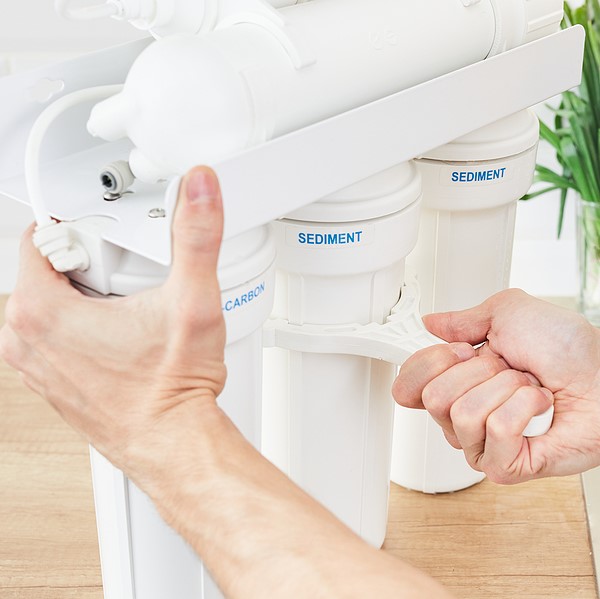Your Water Purification Technologies Guide: RO, UF, UV
Environmental protections safeguarding our groundwater, streams, and wetlands have been weakened over the last four years. These changes have made many people wonder if the water coming out of their tap is safe to drink. Whole-home water treatment systems are a popular solution. These water purification systems treat all the water that flows through your home. Along with catching harmful chemicals and microorganisms, a water treatment system can improve the taste and smell of your water. The most challenging question for most homeowners is, “What type of filter should I get?”
Reverse osmosis (RO), ultra-filtration purification (UF), and ultraviolet purifiers (UV) are three of the most popular filters.
 Reverse Osmosis Purification
Reverse Osmosis Purification
RO water filters are becoming popular around the world. RO filters can remove harmful chemicals, microbes, and total dissolved solids (TDS). TDS includes minerals like calcium and magnesium that make water hard, along with toxic heavy metals like lead. These filters have become popular because of the wide range of contaminates that they can remove.
Inside an RO filter is a semipermeable membrane. The membrane’s pores are just large enough for a water molecule to pass through (around .0005 micron). The membrane catches any large particles as water is washed through the system.
The downside of RO filters is that the membrane removes beneficial minerals from water too. Some people dislike RO systems for this reason because it can make water taste flat. It is one of the few disadvantages of an RO purifier. RO filters can also get clogged quickly if they are not a part of a two-step filtration system. You have to routinely cleanse the filter to ensure it can optimally filter water.
- Pros: Effectively removes chemicals, a majority of microorganisms, and TDS—ideal for hard water.
- Cons: Removes beneficial minerals along with harmful minerals. Requires more maintenance.
Ultra-Filtration Purification
UF water filters are similar to RO filters. This purification method also uses a membrane to catch contaminants. The difference is that the membrane in a UF filter has larger pores than an RO filter. The pores are small enough to remove bacteria and viruses and other microorganisms but not fine enough to remove dissolved solids and salts.
Unlike RO filters, UF filters improve the taste and smell of water. Since the membrane isn’t fine enough to catch TDS, your water will still contain beneficial minerals.
- Pros: Improves water’s taste and smell. Removes any visible impurities.
- Cons: Can’t remove hazardous metals or TDS from water.
Ultraviolet Purifiers
 UV purifiers are best if you are concerned about killing harmful bacteria and viruses. These filters use ultraviolet rays to kill microorganisms in water. UV filters can destroy up to 99.9% of the microorganisms in water.
UV purifiers are best if you are concerned about killing harmful bacteria and viruses. These filters use ultraviolet rays to kill microorganisms in water. UV filters can destroy up to 99.9% of the microorganisms in water.
This method is the most environmentally friendly. It requires less power and produces no water waste (unlike the other two filters). Typically, this purification system is combined with another since it can’t remove any particulate impurities like heavy metals, chlorine, or volatile organic compounds.
- Pros: Kills 99.9% of microorganisms in water. Environmentally friendly.
- Cons: Can’t remove TDS, heavy metals, chlorine, or volatile organic compounds.
Which purification system is best? That answer depends on what is in your water. If your primary goal is to improve your water’s taste, you will benefit from a UF filter. If you have well-water that’s teeming with microorganisms, a UV filter would be a smart choice. If you have hard water or are concerned about heavy metals, a RO filter may be the best option. Finding out what is in your water can help you narrow down your choices. Give us a call to schedule a FREE in-home water analysis to find out what’s in your water!
